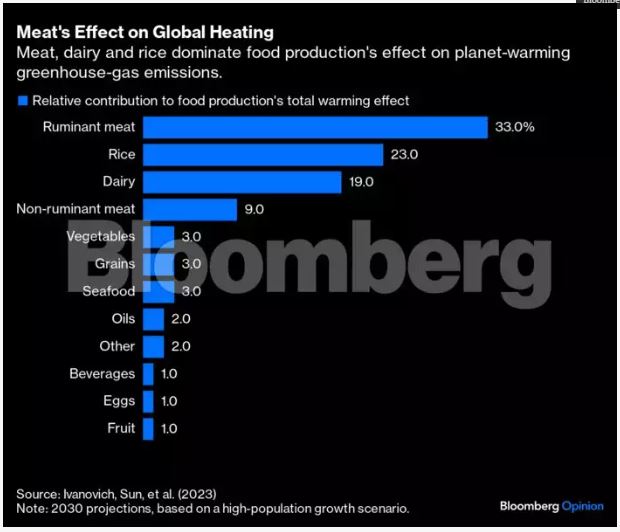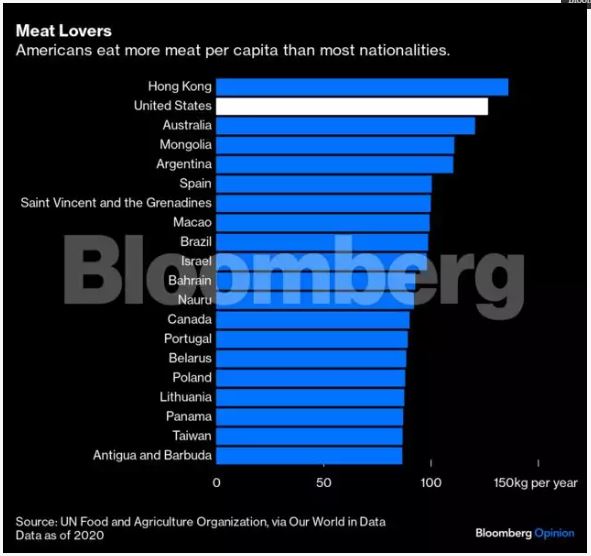We have endured a lot in recent years. From the pandemic and difficult recovery, to inflation and rising interest rates that have raised the cost of living and reduced the purchasing power of the average worker.
Beer: Taste is changing due to climate change
We have chosen everything. But imagine imposing an additional tax on pitogero – which has already become a luxury. Well, that would be the free throw! How much can a person bear?
This is how the average American would see it from their perspective if they were suddenly taxed on…cheeseburgers. “unacceptable”!
Well… even if it’s to save the planet?
“However, this tax on cheeseburgers may be the key to avoiding catastrophic global warming,” Bloomberg drops the bombshell.
Yes Yes. Even if fossil fuels magically disappeared overnight and all forms of energy became exclusively green, would we end climate change and what it means for the planet and humanity? The answer, according to carbon dioxide emissions data, is no.
That’s why cheeseburgers are largely to blame!

Here’s why: Livestock is responsible for 18% of global greenhouse gas emissions in the form of carbon dioxide and methane from cow belches and nitrogen oxide from fertilizers. Deforestation, pollution and consequent loss of biodiversity, which greatly affects the climate.
Even if every other source of greenhouse gases disappeared, food production would still be more than enough to push the planet’s temperature beyond 1.5 degrees Celsius above pre-industrial averages. Meat and dairy farming contribute to most of these emissions.
Meat-eating champions
The fact that Americans are avid meat eaters is probably not that impressive. In a country of extremes and excesses, the average consumer eats about 280 kg of meat per year.
Equally impressive – to the point of infuriating – is the comparison with poorer countries, where per capita meat consumption does not exceed 10 kilograms per year.
The United States is the third largest consumer of beef in the world and the sixth largest consumer of chicken.

To achieve its stated goals of limiting global warming to 1.5 degrees Celsius, the United States would need to reduce meat consumption by 82 percent, according to a recent estimate from the nonprofit Compassion in Global Agriculture. This, of course, would result in Americans eating as much meat as people in East Timor. difficulty…
However, simply cutting meat consumption in half would mean that the average American would eat the same amount of animal protein as, say, Danes. If Americans ate the classic McDonald’s burger (the famous Quarter Pounder) every day, they would reduce their diet-related carbon emissions by 43%, according to a recent study by Oxford University. That’s about half!
It can also reduce the incidence of obesity, cancer and other diseases.
Of course, they may say in polls that they are willing to do this, but from good will to action… millions of burgers the way.
To be fair: in fact, global meat consumption continues to rise as incomes in fast-growing economies boost. People tend to eat more meat, a more expensive food, as much as their finances allow. This is a positive development for undernourished populations, but in developed countries people can eat less meat without missing out.
Is there any solution;
Bloomberg points out that there are steps the livestock and meat industries and governments can take to reduce climate impact, from reducing food waste and pollution to boosting productivity. But the benefit of such measures is short-term. Sooner or later, we will have to deal with the demand side.
Hence the idea of a meat tax, an increasingly hot topic in academia and Europe.
New Zealand is the only country so far to take action, with a methane tax on farms that will come into effect in 2025. It probably won’t be the last. Even Denmark, which eats half as much meat as the United States, thinks so.
The biggest objection to such a tax is that it would harm poor consumers more. However, a recent study in the journal Nature Food shows that their effects could easily be offset by providing tax breaks to these households and lowering taxes on fruits and vegetables. Of course, this may have caught on in Denmark, but there’s a big question mark for the US… Generation Z support for a meat tax is strong, but not everyone.
For the United States, one proposal, perhaps less painful at first, would be to stop subsidizing livestock units to increase their production.
Between 2014 and 2020, the US government spent $10.7 billion annually on direct subsidies to the meat and dairy industry, compared to just $13 million on plants and other meat alternatives, according to a recent study by Stanford University.





More Stories
“Recycling – Changing the water heater”: the possibility of paying the financing to the institution once or partially
Libya: US General Meets Haftar Amid Tensions Between Governments
New tax exemption package and incentives for business and corporate mergers..